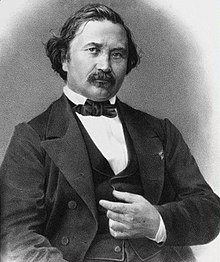Joseph Bertrand
Joseph Louis François Bertrand (born March 11, 1822 in Paris ; † April 5, 1900 there ) was a French mathematician and educator .
Life
Bertrand became known for his elegant applications of differential equations in the field of analytical mechanics , especially thermodynamics , as well as for his work on statistical probability theory , curve theory and surface theory.
After the early death of his father, Bertrand grew up with his sister's husband, Jean-Marie Duhamel, and through him had early contact with mathematics. The mathematicians Charles Hermite (he married Bertrand's sister), Paul Appell, and Émile Picard were later married into Bertrand's relatives, so that his house became an intellectual meeting place. Bertrand spoke Latin fluently at the age of 9 and was admitted to lectures at the École polytechnique at the age of 11 . There he received an academic degree at the earliest possible point in time at the age of 16 and received his doctorate on thermodynamics a year later in 1839 and published his first work. In the same year he officially studied at the École Polytechnique and then at the École des Mines . From 1841 to 1849 he was a high school teacher for mathematics at the Lycée Saint-Louis. During this time he was seriously injured in a railroad accident in 1842 and suffered permanent facial injuries. In the 1848 revolution he was a captain in the National Guard. In 1844 he became a tutor at the École Polytechnique and, from 1856, a professor there as successor to Charles-François Sturm . From 1852 he was a teacher at the Lycée Henri IV and taught at the École normal supérieure . In 1849 he succeeded Jean-Baptiste Biot at the Collège de France , where he taught, apart from a break, from 1878 to 1886, as well as at the École Polytechnique.
In 1845 he assumed that for every n ≥ 1 there was at least one prime number p with n <p ≤ 2n ( Bertrand's postulate ). This was proved by Chebyshev five years later . An 1845 paper on group theory influenced Augustin Louis Cauchy . In 1849 he was the first to define real numbers using Dedekindian cuts , as Detlef Spalt discovered. However, his work was apparently not noticed by German mathematicians (especially Richard Dedekind and Georg Cantor ). In 1855 he translated Gauss's work on error theory and the least squares method into French. He also wrote a number of papers on data reduction from observations. In 1853 he re-published Lagranges Mecanique analytique .
In economics he developed the oligopoly theory further ( Bertrand competition ), in particular Augustin Cournot's competition model .
He wrote Bertrand's paradox in the calculus of probability, contained in his book Calcul des Probabilités from 1888, in which he incidentally does not mention Chebyshev. Henri Poincaré used the book as the starting point for his own textbook in 1896.
During his time, Bertrand was known as the author of textbooks, such as textbooks on arithmetic and elementary algebra (1850), analysis (in two volumes 1864, 1870), thermodynamics (1887), electrodynamics (1890). He also wrote biographies of Blaise Pascal and of astronomers like Kepler .
In 1856 he became a member of the Paris Academy of Sciences , whose permanent secretary he was from 1874. He was also a Grand Officer of the Legion of Honor , a member of the Accademia dei Lincei , since 1859 a corresponding member of the Russian Academy of Sciences and since 1875 a foreign member ("Foreign Member") of the Royal Society .
Bertrand had been married since 1844 and had three sons, one of whom Marcel Bertrand became a well-known geologist.
Works
- Traité de calcul différentiel et de calcul intégral (Paris: Gauthier-Villars, 1864–1870)
- Rapport sur les progrès les plus récents de l'analyse mathématique (Paris: Imprimerie Impériale, 1867)
- Traité d'arithmétique (L. Hachette, 1849)
- Thermodynamique (Paris: Gauthier-Villars, 1887)
- Translation of Gauss: Méthode des moindres carrés (Mallet-Bachelier, 1855)
- Leçons sur la théorie mathématique de l'électricité / professées au Collège de France (Paris: Gauthier-Villars et fils, 1890)
- Calcul des probabilités (Paris: Gauthier-Villars et fils, 1889)
- Arago et sa vie scientique (Paris: J. Hetzel, 1865) (biography of Arago)
- Blaise Pascal (Paris: C. Lévy, 1891)
- Les fondateurs de l'astronomie moderne: Copernic, Tycho Brahé, Képler, Galilée, Newton (Paris: J. Hetzel, 1865)
- L'académie des sciences et les académiciens de 1666 a 1793 (Paris: J. Hetzel, 1869)
Web links
- Short biography and list of works of the Académie française (French)
- John J. O'Connor, Edmund F. Robertson : Joseph Bertrand. In: MacTutor History of Mathematics archive .
- Author profile in the database zbMATH
- Spektrum.de: Joseph Bertrand (1822–1900) March 1, 2017
Remarks
- ↑ Joseph Bertrand: Traité d'Arithmétique 1849, p. 203: “An incommensurable number can only be defined by indicating how the quantity it expresses can be formed by the unit. In the following we assume that this definition consists in indicating which commensurable numbers are smaller or larger than the number .... "
- ↑ Detlef Spalt: A Brief History of Analysis . Springer, 2019, p. 229, doi : 10.1007 / 978-3-662-57816-2 .
- ↑ a planned third volume burned with his house during the fighting for the Paris Commune. Bertrand then moved away from Paris.
| personal data | |
|---|---|
| SURNAME | Bertrand, Joseph |
| ALTERNATIVE NAMES | Bertrand, Joseph Louis François (full name) |
| BRIEF DESCRIPTION | French mathematician and educator |
| DATE OF BIRTH | March 11, 1822 |
| PLACE OF BIRTH | Paris |
| DATE OF DEATH | April 5, 1900 |
| Place of death | Paris |
